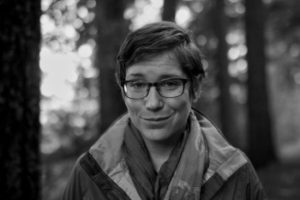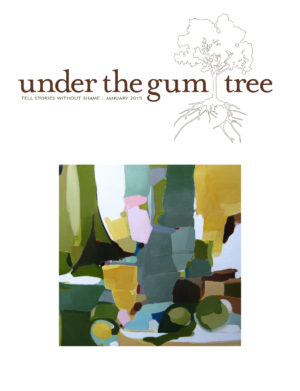Judith Pulman

Judith Pulman writes both poetry and prose in Portland, Oregon where in between working as a teacher, administrator, and editor, she also translates poems from Russian to English—just to keep things light. Judith has been published in or has work forthcoming from The Writer’s Chronicle, Los Angeles Review, Brevity, New Ohio Review, and Basalt. Read more about Judith and her own work at her blog here.
Judith’s piece, “Prelude to the Performance,” masterfully levels her readers upon an equal canvas, bringing us back to the magic and wonder of being eight years old. We are intimately woven into the piece by her ability to recollect specific details of the first time visiting her mother at the Kennedy Center where she sang in the opera. Through sound, sight, textures and feel, we are transported. When she recalls her heart surging at the “gorgeousness and terror” before the performance of Tosca, we feel the same anticipation and awe.
Watch Judith read an excerpt of her piece from the recording of Gum Tree Live: follow this link to 18:30 minutes.
Is it one of your strongest memories for you to remember it so well?
I went to the opera from when I was five to when my mother died when I was twenty, so this is more or less a culmination of some experiences and an attempt to explore the confusion I felt at that time. My mother was a chorister, and the Kennedy Center was my cathedral along with my place to know magic. I knew no children who also loved the opera; the opera was a world of adults and the elderly when I went there. This situation made me feel both isolated and very special, depending on how my world outside the opera was going.
Or, did your childhood consist of frequenting the opera, so was this story a culmination of multiple experiences?
Opera is one of the most lavish art forms available, and in the ’90s and early 2000s when I was attending, directors hadn’t really been casting actors or trying to make productions anything close to realistic (the Metropolitan Opera’s regular Live in HD broadcast has changed the game). So I grew up seeing these stories that didn’t make any logical sense and accepting them as a matter of course. Opera stories are thus: Tragedy happens, people die and are ridiculed, affairs happen, timing is generally awful, love is random and sudden and not usually advantageous, and hate can motivate one to ruin their own lives. Did growing up loving these stories prepare me for life better than watching “Full House?” The verdict is still out.
Your story really comes alive with the specific details: the “thud-clack-thud-clack” of your heels on the “rust-tiled concrete,” or the hushed and sultry conversation of the loungers at the top-tier bar, even the multiple references to the angelic voices of the opera singers. It is a piece about music, but the sounds you captured are acutely precise. Did you intend for your piece to be very aware in and of itself with sound?
Thank you! I intended for the piece to be sensory since everything about the Kennedy Center is beautiful, and the hall before you go into the Opera House is enormous and full of sound. There are three tiers and everything is so high up, sound does interesting things in a place like that. Also, opera is unique in its performance since the singers aren’t generally miked—so their voices have to be huge to fill that space. I always thought that this was an incredible fact and from the second tier would try to pinpoint my mother’s voice among the women’s chorus.
You can see a 3-D view of the Kennedy Center’s Grand Foyer here. It is as stunning as I remember it looking. Side note: There’s a bronze bust of JFK before the steps up to the opera house that weighs 3,000 pounds and is eight feet tall. It looks like his skin is melting off and it always scared the hell out of me to see it. I took it to be a symbol of national grief since he had been killed but now I don’t know.
In your piece you write, “I wonder what will happen when I grow up; who will be there to see the world behind the apparent world?” What did you intend that to mean? Children really do have this amazing perceptibility that we as adults lose in the process of growing up. But at that time, why then did it register to you that you didn’t want to lose that keen ability?
It’s hard to continually hold in one’s consciousness of how everything in life has its own brand of sacredness—both objects that fill the world and life forms that fill it. Even now, as I’m sitting here at the computer eating chips with two guinea pigs, and a dog in a house in the amazing city where I live, am I remembering how special and precious every bit of it is? Nope. Because I’ve got work to do and money to make and commitments to keep today. When I was a kid, I was acutely aware that the opera was sacred, even though it was my mother’s workplace (she usually talked about it as if it were sacred!). When I walked around with my grandmother before the opera or talked to the people sitting next to us, it became clear that few adults recognized how special this show was and that it was, in fact, a once-in-a-lifetime event, since it was live theater. And lord, those ticket prices—$300 or something! And then some people would fall asleep during the show: How distressing to hear a person snoring or unwrapping cough drops in the second act of La Traviata. Why did they come if not to worship and give it their full focus?
In the second to last paragraph, you seem pretty willing to abandon your family’s religion if it’s in exchange for a more lavish lifestyle like those of the regular opera goers, which, to an eight-year-old, doesn’t seem like a bad tradeoff at all. But what was behind that thinking?
I was different as a kid and couldn’t explain my identity in terms that others understand. Perhaps this is why I took up poetry and writing, because I wanted to explain the beauty and needed to find common language (or uncommon language, but at least, language that reached across the table.) Growing up in a family with extremely talented parents was difficult. I sang in the children’s chorus twice but early on it became obvious that no amount of training would make me into an opera singer. This was heartbreaking, but hey, there’s another reason that I took up writing. The abandonment issue is something that I’ve heard therapists refer to as “rejecting the rejector.” I was willing to abandon the religion because it made me strange but not strange in a way that I understood as beautiful, strange because I had no idea what it would look like if I owned that Jewishness that was mine. I had no good models of what it looked like to be Jewish (we didn’t go to temple, just celebrated some holidays), so, why would I accept the stink eye from some people who didn’t like Jews if I didn’t know what the benefits of that religion would be?




